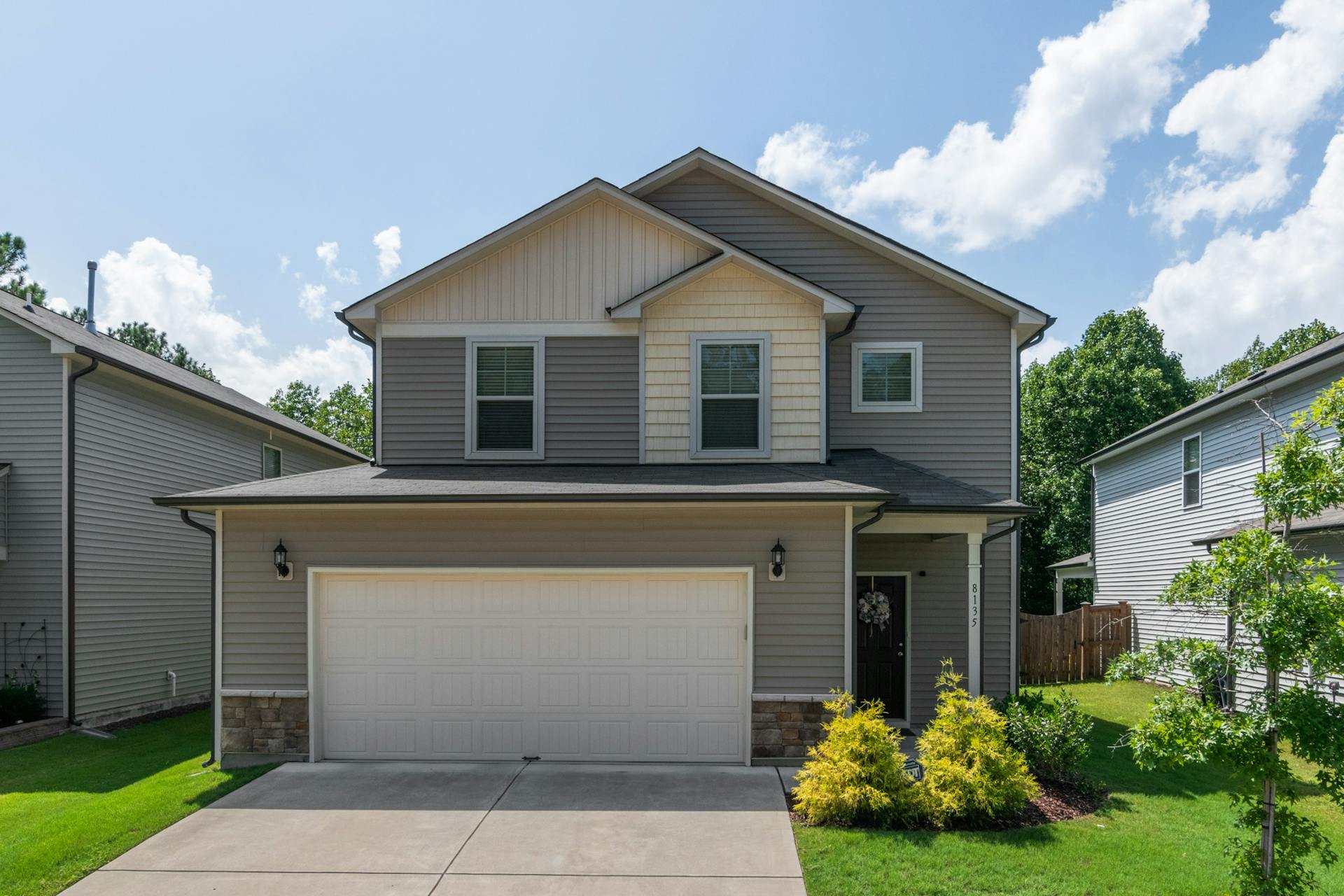
To be eligible for a reverse mortgage, you must be at least 62 years old. This is the minimum age requirement set by the Federal Housing Administration (FHA).
You must also own your home outright or have a low balance on your mortgage. This means you've either paid off your mortgage in full or have a significant amount of equity in your home.
The home you're applying for must be your primary residence. This means you can't use a reverse mortgage on a vacation home or rental property.
You'll need to demonstrate financial responsibility, such as paying your property taxes and insurance on time.
What Is a Mortgage?
A reverse mortgage is a type of home loan that lets you convert some of your home's equity into cash without selling your home or adding extra monthly bills.
You can use the proceeds from a reverse mortgage for living expenses, medical expenses, to pay off your first mortgage, or any other purpose.
Reverse mortgages don't have to be paid back until you pass away or move out of your home. You can use the sale of your home to pay off the loan, or your heirs can sell the home to repay the loan if you pass away. If your heirs can't repay the loan, the lender takes possession of the property.
A Home Equity Conversion Mortgage, or HECM, is the only reverse mortgage insured by the US Federal Government. It's available through an FHA-approved lender and is insured by the US Department of Housing and Urban Development.
For more insights, see: Lender Paid Buydown
Borrower Requirements
To qualify for a reverse mortgage, you'll need to meet certain borrower requirements.
You must be at least 62 years old, as required by the Federal Housing Authority (FHA) for Home Equity Conversion Mortgages (HECMs).
To be eligible, you should own your property outright or have paid down a considerable amount, making it a significant asset.
Occupying the property as your principal residence is a must, as it's a crucial factor in determining your eligibility.
You should not be delinquent on any federal debt, as this can impact your ability to qualify for a reverse mortgage.
Participating in a consumer information session given by a HUD-approved HECM counselor is also a requirement.
Here's a breakdown of the typical requirements for different types of reverse mortgages:
How Reverse Mortgages Work
A reverse mortgage is a type of loan that allows homeowners to borrow money using the equity in their home as collateral. To qualify, borrowers typically must be at least 62 years old, and the loan must be secured by the borrower's primary residence.
The loan amount is based on the home's value, the borrower's age, and current interest rates. For example, a $200,000 home with a 65-year-old borrower might qualify for a loan of $120,000.
The borrower can choose to receive the loan amount as a lump sum, monthly payments, or a line of credit, or a combination of these options.
Curious to learn more? Check out: Using Rental Income to Qualify for Conventional Mortgage
How Mortgages Work

A reverse mortgage can be a bit confusing, but let's break it down. You can choose among several payment options, which include a term option, tenure option, line of credit, or a combination of monthly payments and a line of credit.
These options give you flexibility, but if your circumstances change, you can change your payment option for a fee of $20. You'll still be responsible for taxes, insurance, maintenance, and repair, and you can never owe more than the value of your home at the time the loan is repaid.
The amount you can borrow depends on your age, the current interest rate, the appraised value of your home, and government-imposed lending limits. The Department of Housing and Urban Development sets a mortgage limit for HECM reverse mortgage loans, which is currently $765,600 in 2020.
Here's a breakdown of the payment options:
- Term option: fixed monthly cash advances for a specific time.
- Tenure option: fixed monthly cash advances for as long as you live in your home.
- Line of credit: lets you draw down the loan proceeds at any time in amounts you choose until you've used up the line of credit.
- Combination of monthly payments and a line of credit: gives you flexibility in how you receive your loan proceeds.
Reverse Mortgage Requirements
To qualify for a reverse mortgage, you typically need to be at least 62 years old, although this can vary for private reverse mortgages. Some lenders may have unique requirements, so it's essential to check with them directly.
The equity in your home is also a crucial factor, as you'll need to have at least 50% equity in your home to be eligible for a reverse mortgage. This means that you'll need to have paid off a significant portion of your mortgage or have a substantial amount of equity built up in your home.
You'll also need to own your home outright or have a very low balance on your mortgage. This is because reverse mortgages are typically only available for primary residences.
In terms of debt, you'll need to have no delinquent federal debt to qualify for a reverse mortgage. This includes debts such as unpaid taxes or student loans. You'll also need to have a good credit history, although some lenders may not require a minimum credit score for a HECM.
It's worth noting that some lenders may have unique requirements for private reverse mortgages, so it's essential to check with them directly. Additionally, you'll need to continue paying ongoing homeownership expenses, such as property taxes and home insurance, even after taking out a reverse mortgage.
Here's a summary of the typical requirements for a reverse mortgage:
Pitfalls and Considerations

Reverse mortgages can be costly, and seniors may only see 30% to 80% of their home's value through this type of loan.
There are several fees associated with taking out a reverse mortgage, including an origination fee capped at $6,000, closing costs, a mortgage insurance premium, interest, and a servicing fee of $35 per month.
Some reverse mortgages carry fixed interest rates, while others are adjustable. This disparity can result in significant differences in the amount of home equity that borrowers can access.
Here are some of the typical fees associated with a reverse mortgage:
- Origination fee: capped at $6,000
- Closing costs
- Mortgage insurance premium
- Interest
- Servicing fee: $35 per month
Pitfalls - Caution
A reverse mortgage can be a great opportunity for seniors to tap into their home's equity, but it's not for everyone. The costs can add up quickly.
An origination fee is typically capped at $6,000, which is a significant upfront cost. Closing costs also apply, and there's a mortgage insurance premium to consider.
The interest rate on a reverse mortgage can be fixed or adjustable, so it's essential to understand the terms before signing. A servicing fee of $35 per month is also a regular expense.
In general, the older you are, the more equity you'll have in your home, and the less you'll owe on it, which means you can get more money through a reverse mortgage.
Explore further: Mortgage Arrangement Fee
Debt
Debt can be a major obstacle to qualifying for a HECM, but it's not impossible to overcome. You must not have any delinquent federal debt, such as a federal student loan or tax bill.
Using the money from a HECM to pay off overdue federal debts is a viable option, but it's essential to understand the terms and conditions of your loan.
If this caught your attention, see: Mortgage Loans Based on Bank Statements Not Taxes
Counseling
To get a HECM, you must participate in a HUD-approved counseling course.
You'll need to complete this course to ensure you understand the terms and risks involved in a HECM. Counseling is a crucial step in the process.
In some areas, like New York, you're required to receive in-person counseling unless you have a written waiver. This requirement may vary depending on where you live.
It's essential to understand the counseling requirement for your specific location before moving forward with a HECM.
Worth a look: Hecm Counseling Certificate
Eligibility and Requirements
To qualify for a reverse mortgage, you must meet certain eligibility requirements. These requirements include being at least 62 years old, although some lenders may allow applicants as young as 55 for private reverse mortgages. Some states, like New York, require private reverse mortgage borrowers to be at least 60.

You'll also need to have at least 50% equity in your home. This means that the value of your home must be at least 50% higher than the amount you owe on your mortgage. To determine this, lenders will typically order an appraisal of your home.
Here are the typical requirements for different types of reverse mortgages:
Age
You must be at least 62 years old to qualify for a HECM. Some lenders will allow applicants as young as 55 to qualify for a private reverse mortgage. In addition, some states, like New York, require private reverse mortgage borrowers to be at least 60.
The age requirement can vary depending on the type of reverse mortgage you're interested in. Here's a breakdown of the age requirements for different types of reverse mortgages:
Who Sets Eligibility Requirements?
The U.S. Department of Housing establishes the eligibility requirements for HECMs. The FHA makes any adjustments to the maximum HECM payout each year based on national average home prices.
Private and single-purpose reverse mortgages are subject to state laws, which can change eligibility requirements. Lenders may also adjust eligibility requirements for private reverse mortgages based on business needs or economic changes.
Explore further: Is an Heloc Based on Home Equity or Home Value
Requirements

To be eligible for a reverse mortgage, you typically need to be at least 62 years old, have at least 50% equity in your home, and live in a primary residence. This is a common requirement for Home Equity Conversion Mortgages (HECMs).
The type of reverse mortgage you're eligible for can also impact the requirements. For example, private reverse mortgages may have different age and credit score requirements than HECMs.
You'll also need to meet debt and credit requirements, including having no delinquent federal debt and a good credit history. However, not all reverse mortgages require a minimum credit score.
One thing to note is that you'll still need to pay ongoing homeownership expenses, like property taxes and home insurance, even with a reverse mortgage.
Here are the typical requirements for a reverse mortgage:
Keep in mind that lenders may have unique requirements for private reverse mortgages, and requirements can change over time.
Frequently Asked Questions
What is the 60% rule in reverse mortgage?
The 60% rule in reverse mortgage limits HECM borrowers to taking the greater of 60% of their total available equity or 110% of their mandatory obligations in the first payout. This rule ensures borrowers don't over-borrow from their home's value.
What is the 5 and 5 rule for reverse mortgage?
The 5-5 rule for reverse mortgages requires that the new loan's principal be at least 5 times the closing costs, and the loan proceeds be more than 5% of the refinanced amount. This rule helps lenders ensure borrowers receive sufficient funds to cover costs and benefits.
How much equity is required for a reverse mortgage?
Typically, you'll need at least 50% equity in your home to qualify for a reverse mortgage, but this may vary depending on the lender. Check with your lender for specific requirements.
Sources
- https://www.fha.com/fha_article
- https://www.peoples-law.org/reverse-mortgages
- https://lendedu.com/blog/reverse-mortgage-requirements/
- https://www.ecfr.gov/current/title-12/chapter-II/subchapter-A/part-226/subpart-E/section-226.33
- https://retirementresearcher.com/eligibility-requirements-for-a-reverse-mortgage/
Featured Images: pexels.com

